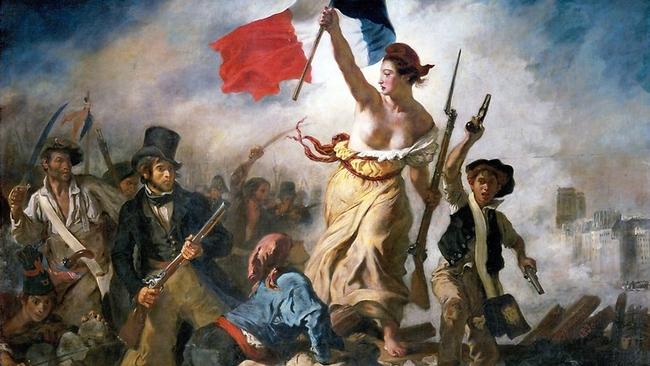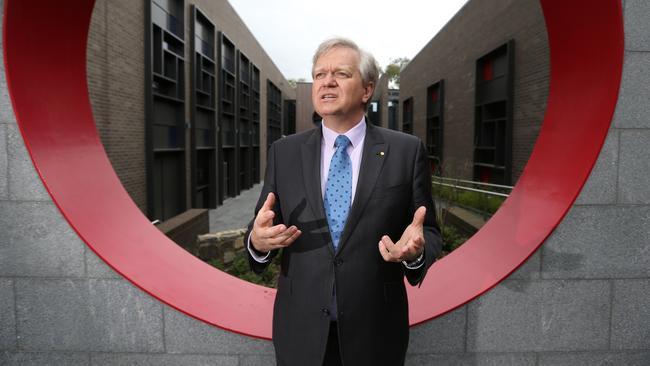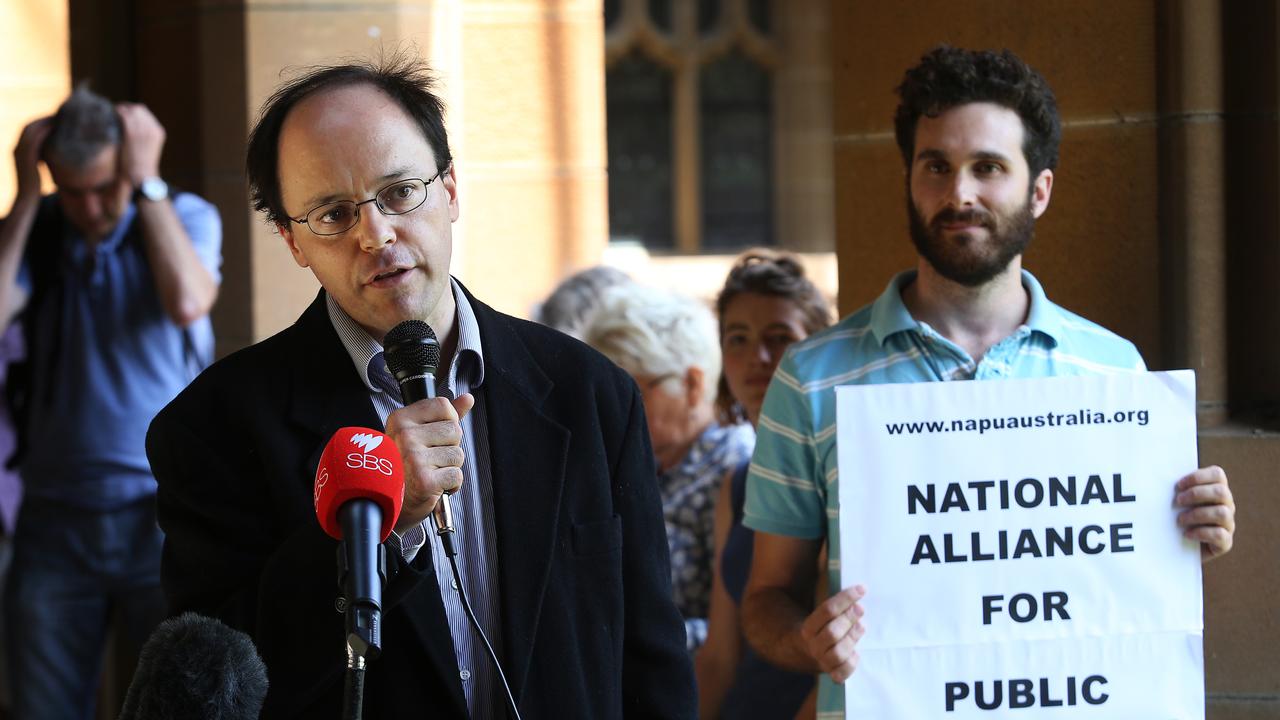
Trigger warning: the following contains references to material that tolerant and progressive people will find distressing and offensive, including hate-speech and micro-aggressions. It portrays favourably the most racist, sexist, hegemonic, homophobic, and imperialist society known to peoplekind – the euphemistically titled ‘Western civilisation’. Students and academics alike are strongly advised not to read it. Should someone intrude upon your safe space and read this article aloud to you, we recommend you cover your ears, writhe furiously on the ground, and repeatedly scream ‘Narrative violation’ until a campus counsellor comes to your assistance.
If any philanthropic body wished to fund studies into pusillanimity — that human condition better known informally as kowtowing, spineless, and lack of ticker — the Australian National University in Canberra would be the ideal institution to host it. Citing supposed concerns about institutional and academic autonomy last week, the ANU rejected an offer by the Ramsay Centre, chaired by former prime minister John Howard, to fund a Western civilisation program.
As Australian Catholic University vice-chancellor Greg Craven observed, the ANU’s decision was “the greatest act of gutlessness since Trevor Chappell bowled under¬arm to New Zealand”.
“What’s happening here is not an attempt to protect a diverse range of studies and views around civilisation,” he said, “but to make sure one particular view, as far as possible, is kept ruthlessly out of the university.”
Craven is right. Only last month the left-leaning National Tertiary Education Union warned of a “backlash” against the proposed partnership, claiming it amounted to a “divisive cultural and political agenda”. Writing to ANU vice-chancellor Brian Schmidt, the NTEU’s ACT branch cited the “grave concerns” of academics that “the Ramsay Centre seeks to pursue a narrow, radically conservative program to demonstrate and promulgate the alleged superiority of Western culture and civilisation”. This extrapolation is alarmist. Is this really the union that speaks for Australia’s intellectuals?
If only the histrionics were limited to the union. In March, the ANU Observer reported that the president of the ANU Postgraduate and Research Students’ Association, Alyssa Shaw, expressed “concerns of indigenous students with Ramsay centre’s affiliation with the [political] right”. What concerns? Apparently these students may “feel unsafe”. Not surprisingly, the bio of Shaw’s Twitter account proudly declares she is a “Wannabe social justice crusader”.
Now imagine you were Raelene Frances, Dean of the College of Arts and Social Sciences, and that you had to respond to these concerns. Perhaps you might say, as tactfully as possible, that the Ramsay Centre is not known for advocating white supremacy. Or if you weren’t feeling so diplomatic, you could reply that a student with such concerns is in urgent need of a resilience coach. Frances, while encouraging students to enrol in the proposed program, instead said that “indigenous activists should have a deep knowledge of the colonisers’ ideas to better fight them”. If this is the prevailing mentality at our universities, should we just cut the funding and acknowledge we have lost our tertiary institutions to tribalism?
Just consider how the ANU would react if Bruce Gilley, a professor of political science at Portland State University, were to speak at one of its conferences. Last year in a paper for Third World Quarterly he questioned the orthodoxy of condemning western colonialism, claiming that independence for developing countries had led to a “cesspool of human suffering”. Controversially, he also argued that Western rule should be reintroduced in those countries.
In signing a Facebook petition calling for a retraction and an apology, ANU history lecturer Dr Patricia O’Brien linked Gilley’s views with “white supremacy movements”.
“My first instinct was to not increase publicity for this latest outing of the ‘colonialism was good’ argument,” she wrote. “But like a dog returning to its vomit here it is again. And it’s no coincidence it appears now along with the recent rise of white supremacy movements in their many ugly guises.” You do not have to accept all of Gilley’s argument to acknowledge that many postcolonial developing countries are indeed basket cases, but that of course would be hate speech and racism.

No doubt her legal anthropologist colleague Dr Siobhan McDonnell would agree. “Working alongside many @ANU_NCIS colleagues this #AustraliaDay in acknowledgment of the ongoing survival of indigenous Australians in spite of Australia’s violent colonial past and ongoing structural violence,” she tweeted this year. “We need to #ChangeTheDate #InvasionDay #SurvivalDay.” How incredibly woke is that?
Not as woke as her science communication colleague Dr Lindy Orthia, the editor of the book Dr Who and Race. It features essays such as “The white Doctor’’, and “Conscious colour-blindness, unconscious racism in Doctor Who companions’’, and “Baby steps: A modest solution to Asian under-representation in Doctor Who’’.
“We believe these essays make an important contribution to discussions of race and Doctor Who,” writes Orthia. “Most of the contributors, through identifying with diverse ethnic backgrounds, live in or hail from Australia or the United States, so many of the essays approach ‘race’ from perspectives…such as colonialism, the dispossession of indigenous lands and Europeans’ enslavement of Africans,” she adds. Given her expertise in analysing science fiction through these themes, perhaps she could ponder a scenario where a traveller from the Ramsay Centre were to land on planet ANU and seek a respectful dialogue with the natives based on peace and education. It’s not hard to imagine in response those high-pitched agitated voices and the frantic waving of appendages to the cries of “Exterminate, exterminate!”
In an article last year for The Conversation titled “Monumental errors: how Australia can fix its racist colonial statues’’, ANU history professor Bruce Scates deplored the “sanitised symbols of violence and dispossession [which] have long stood unchallenged in the heart of our towns and cities.”
“By occupying civic space they serve to legitimise narratives of conquest and dispossession, arguably colonising minds in the same ways white “settlers” seized vast tracts of territory,” he wrote. Colonising minds? Just a tip: if you resort to using the adverb “arguably’’ as a means of persuasion, chances are you are trying to buttress an assertion that lacks evidence. As big a stretch as that was, it wasn’t as risible as Scates’s next statement.
“Would those opposing the altering of Australia’s colonial statues have also opposed the demolition of the Berlin Wall, or the toppling of statues of Saddam Hassein (sic)?” How is that for moral equivalence? If you are in favour of leaving our ‘colonial’ statues intact – even just for the sake of posterity – you must be as bad as the Communists or those of the murderous Ba’ath Party.
As for ANU vice-chancellor Schmidt, he really needs to ponder this question: Given attitudes like this dominate on campus, do you really think the Ramsay Centre constitutes an existential threat? If the NTEU is such a strident defender of academic autonomy, why does it not voice opposition to the fact that 13 Australian universities host the China-funded Confucius Centres which are responsible for assigning teachers and dictating curriculum? What of the ANU’s Centre for Arab and Islamic Studies, which accepts donations from countries such as the United Arab Emirates and Iran?
Speaking at Schimidt’s investiture in 2016, chancellor Gareth Evans warned staff not to “make the mistake of thinking Brian should be a soft touch.” His backdown in this affair, however, has given exactly that impression. Your taxes subsidise a bunch of spoiled brats who refuse to share the sandpit with those who would build castles as opposed to undermining them. Would it be too much to expect Schmidt – who draws a salary of $618,000 – to stand up to his subordinates?
When he began his term, Schmidt spoke of his desire to make the ANU a “happy workplace and a safe place to study”. Therein lies the problem. The role of a university is not to coddle students or to indulge them. Rather, it is to challenge them; to expose them to robust debate, irrespective of whether or not they find this confronting. If a university can teach romantic notions of primitivism or the victimhood-obsessed gender studies, surely it cannot hurt to provide balance and permit a degree dedicated to the positives of Western civilisation?
Regrettably, it is too much trouble. So much for the university’s motto ‘Naturam Primum Cognoscere Rerum’ (First to learn the nature of things). It is time to consider a replacement motto. On that note what is Latin for “Now Political Correctness Rules’’?







To join the conversation, please log in. Don't have an account? Register
Join the conversation, you are commenting as Logout